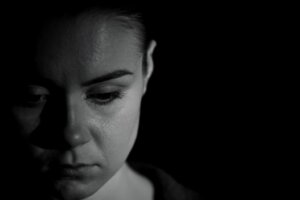How to Recognize and Heal The Humiliation Wound


Written and verified by the psychologist Elena Sanz
Are you ashamed of your body, your appearance, or the way you behave? Do you choose partners who humiliate you? Do you feel guilty for allowing yourself certain pleasures yet find yourself doing everything for others even though they don’t appreciate it? If so, you’re possibly suffering from a humiliation wound.
This is one of the childhood wounds described by Canadian author Lise Bourbeau in her wonderful book, Heal Your Wounds and Find Your True Self. Furthermore, this wound is the most difficult to recognize. Therefore, it’s likely that, when you first read about it, you won’t identify with it. However, once you become aware of it and decide to heal it, everything will change profoundly.
Childhood injuries
According to Bourbeau, the five childhood wounds are emotional impacts you encountered in your first experiences with your parents that you were unable to process. In these interactions, you expected unconditional love and acceptance, but, in reality, this is practically impossible to achieve all the time.
Certain words, acts, or attitudes of parents have an impact on their children, whose childish minds don’t yet have the resources to face what happens to them. Consequently, they create, a ‘mask’ which is nothing more than a defense mechanism to allow them to survive emotionally.
This mask encompasses a set of beliefs, interpretations, and behavior patterns that are set in motion when situations similar to those that triggered it in the first place are experienced. The problem is that, over time, this mask ceases to be functional. In fact, as adults, we already have personal tools to face life, but we continue to revive that initial childhood wound and activate the kinds of defenses that no longer serve us.

The wound of humiliation
In the case of the humiliation wound, it usually arises between the first and third years of life. This is the time when children acquire a certain autonomy over their bodies by learning to eat, walk, or go to the bathroom. At some point, they may have felt humiliated, criticized, or compared to others by their parents. For example, perhaps they got their clothes dirty, wet the bed, or acted with the lack of control typical of a child, and were ridiculed, repressed, or branded as dirty or unworthy.
It’s worth mentioning here that it’s not so much what happens, but how the child perceives it that causes the humiliation wound to open. In fact, this emotional impact activates shame, guilt, anger, and even submission. These elements form part of the mask of the masochist. It’s a mask that guides their interpretations and behaviors, even influencing their adult relationships.
How does it manifest?
There are various aspects to consider in order to recognize if you’re suffering from a humiliation wound. Here are some of the most frequent:
- You feel that suffering is a constant in your life. Everything is an effort for you and your endeavors are often unsuccessful. Indeed, it’s difficult for you to imagine yourself ever achieving what you really want.
- You frequently feel ashamed of yourself. Furthermore, you tend to get involved in situations that make you feel ridiculous or choose partners who humiliate or belittle you.
- You don’t like to go fast, but you also don’t allow yourself to go at your own pace. In addition, you feel ashamed for not being able to reach the same pace as others.
- You give too much to other people. You do everything for them, even setting aside your own wants and needs. Deep down, you hope that they recognize and appreciate your work, but this never happens. On the contrary, they tend to take advantage of you or override you.
- You’re shy, insecure, and indecisive. You worry about what others think of you, especially your parents, whom you always try to please.
- You’re hypersensitive and easily hurt. Criticism affects you excessively and you don’t know how to deal with it.
- You feel responsible for the happiness of others and take charge of matters that don’t concern you. Sometimes, you feel like you carry too much on your shoulders, but you can’t help it.
- You may have sexual problems related to embarrassment and difficulty in allowing yourself pleasure. Perhaps you consider sexuality as something dirty or something that you’re not worthy of.
- You tend to compensate for your negative emotions with food, especially those that are sweet and processed. In fact, food acts as a prize and a consolation for you. However, you’re embarrassed when others see you eat and you feel guilty for doing so.
- Lise Bourbeau also points out that people suffering from the humiliation wound tend to have large, round bodies. Thus, their figure and weight are one more reason to feel unhappy and be ridiculed.

Healing the humiliation wound
Like the other four wounds, the humiliation wound can be healed if you, as an adult, become aware of the damage and the mask you’re wearing. However, this is no easy task. That’s because it’s painful for you to accept that you feel ridiculed, both by others and yourself. Nevertheless, it’s an essential first step.
You must change your habits. For instance, you should begin to listen and attend to your own needs, stop excessively worrying about others, and adopt a positive internal dialogue in which you don’t compare or humiliate yourself. In fact, you should simply allow yourself to be yourself.
In this process, it can be useful to have a therapist. They’ll be able to help you identify the source of your injury and guide you through the process of removing your mask. So if you’ve identified with any of the above, don’t hesitate to seek help.
Are you ashamed of your body, your appearance, or the way you behave? Do you choose partners who humiliate you? Do you feel guilty for allowing yourself certain pleasures yet find yourself doing everything for others even though they don’t appreciate it? If so, you’re possibly suffering from a humiliation wound.
This is one of the childhood wounds described by Canadian author Lise Bourbeau in her wonderful book, Heal Your Wounds and Find Your True Self. Furthermore, this wound is the most difficult to recognize. Therefore, it’s likely that, when you first read about it, you won’t identify with it. However, once you become aware of it and decide to heal it, everything will change profoundly.
Childhood injuries
According to Bourbeau, the five childhood wounds are emotional impacts you encountered in your first experiences with your parents that you were unable to process. In these interactions, you expected unconditional love and acceptance, but, in reality, this is practically impossible to achieve all the time.
Certain words, acts, or attitudes of parents have an impact on their children, whose childish minds don’t yet have the resources to face what happens to them. Consequently, they create, a ‘mask’ which is nothing more than a defense mechanism to allow them to survive emotionally.
This mask encompasses a set of beliefs, interpretations, and behavior patterns that are set in motion when situations similar to those that triggered it in the first place are experienced. The problem is that, over time, this mask ceases to be functional. In fact, as adults, we already have personal tools to face life, but we continue to revive that initial childhood wound and activate the kinds of defenses that no longer serve us.

The wound of humiliation
In the case of the humiliation wound, it usually arises between the first and third years of life. This is the time when children acquire a certain autonomy over their bodies by learning to eat, walk, or go to the bathroom. At some point, they may have felt humiliated, criticized, or compared to others by their parents. For example, perhaps they got their clothes dirty, wet the bed, or acted with the lack of control typical of a child, and were ridiculed, repressed, or branded as dirty or unworthy.
It’s worth mentioning here that it’s not so much what happens, but how the child perceives it that causes the humiliation wound to open. In fact, this emotional impact activates shame, guilt, anger, and even submission. These elements form part of the mask of the masochist. It’s a mask that guides their interpretations and behaviors, even influencing their adult relationships.
How does it manifest?
There are various aspects to consider in order to recognize if you’re suffering from a humiliation wound. Here are some of the most frequent:
- You feel that suffering is a constant in your life. Everything is an effort for you and your endeavors are often unsuccessful. Indeed, it’s difficult for you to imagine yourself ever achieving what you really want.
- You frequently feel ashamed of yourself. Furthermore, you tend to get involved in situations that make you feel ridiculous or choose partners who humiliate or belittle you.
- You don’t like to go fast, but you also don’t allow yourself to go at your own pace. In addition, you feel ashamed for not being able to reach the same pace as others.
- You give too much to other people. You do everything for them, even setting aside your own wants and needs. Deep down, you hope that they recognize and appreciate your work, but this never happens. On the contrary, they tend to take advantage of you or override you.
- You’re shy, insecure, and indecisive. You worry about what others think of you, especially your parents, whom you always try to please.
- You’re hypersensitive and easily hurt. Criticism affects you excessively and you don’t know how to deal with it.
- You feel responsible for the happiness of others and take charge of matters that don’t concern you. Sometimes, you feel like you carry too much on your shoulders, but you can’t help it.
- You may have sexual problems related to embarrassment and difficulty in allowing yourself pleasure. Perhaps you consider sexuality as something dirty or something that you’re not worthy of.
- You tend to compensate for your negative emotions with food, especially those that are sweet and processed. In fact, food acts as a prize and a consolation for you. However, you’re embarrassed when others see you eat and you feel guilty for doing so.
- Lise Bourbeau also points out that people suffering from the humiliation wound tend to have large, round bodies. Thus, their figure and weight are one more reason to feel unhappy and be ridiculed.

Healing the humiliation wound
Like the other four wounds, the humiliation wound can be healed if you, as an adult, become aware of the damage and the mask you’re wearing. However, this is no easy task. That’s because it’s painful for you to accept that you feel ridiculed, both by others and yourself. Nevertheless, it’s an essential first step.
You must change your habits. For instance, you should begin to listen and attend to your own needs, stop excessively worrying about others, and adopt a positive internal dialogue in which you don’t compare or humiliate yourself. In fact, you should simply allow yourself to be yourself.
In this process, it can be useful to have a therapist. They’ll be able to help you identify the source of your injury and guide you through the process of removing your mask. So if you’ve identified with any of the above, don’t hesitate to seek help.
All cited sources were thoroughly reviewed by our team to ensure their quality, reliability, currency, and validity. The bibliography of this article was considered reliable and of academic or scientific accuracy.
- Bourbeau, L. (2011). Las cinco heridas que impiden ser uno mismo. OB STARE.
- Bourbeau, L. (2017). La sanación de las 5 heridas. EDITORIAL SIRIO SA.
This text is provided for informational purposes only and does not replace consultation with a professional. If in doubt, consult your specialist.







